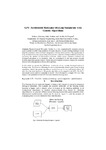Mostrar o rexistro simple do ítem
GPU Accelerated Molecular Docking Simulation with Genetic Algorithms
| dc.contributor.author | Altuntas, Serkan | |
| dc.contributor.author | Bozkus, Zeki | |
| dc.contributor.author | Fraguela, Basilio B. | |
| dc.date.accessioned | 2021-12-01T15:16:06Z | |
| dc.date.available | 2021-12-01T15:16:06Z | |
| dc.date.issued | 2016 | |
| dc.identifier.citation | Altuntaş S., Bozkus Z., Fraguela B.B. (2016) GPU Accelerated Molecular Docking Simulation with Genetic Algorithms. In: Squillero G., Burelli P. (eds) Applications of Evolutionary Computation. EvoApplications 2016. Lecture Notes in Computer Science, vol 9598. Springer, Cham. https://doi.org/10.1007/978-3-319-31153-1_10 | es_ES |
| dc.identifier.uri | http://hdl.handle.net/2183/29046 | |
| dc.description | The final publication is available at Springer via https://doi.org/10.1007/978-3-319-31153-1_10 | es_ES |
| dc.description.abstract | [Abstract] Receptor-Ligand Molecular Docking is a very computationally expensive process used to predict possible drug candidates for many diseases. A faster docking technique would help life scientists to discover better therapeutics with less effort and time. The requirement of long execution times may mean using a less accurate evaluation of drug candidates potentially increasing the number of false-positive solutions, which require expensive chemical and biological procedures to be discarded. Thus the development of fast and accurate enough docking algorithms greatly reduces wasted drug development resources, helping life scientists discover better therapeutics with less effort and time. In this article we present the GPU-based acceleration of our recently developed molecular docking code. We focus on offloading the most computationally intensive part of any docking simulation, which is the genetic algorithm, to accelerators, as it is very well suited to them. We show how the main functions of the genetic algorithm can be mapped to the GPU. The GPU-accelerated system achieves a speedup of around ~ 14x with respect to a single CPU core. This makes it very productive to use GPU for small molecule docking cases. | es_ES |
| dc.description.sponsorship | Sekan Altuntaş and Zeki Bozkus are funded by the Scientific and Technological Research Council of Turkey (TUBITAK; 112E191). Basilio B. Fraguela is supported by the Ministry of Economy and Competitiveness of Spain and FEDER funds of the EU (ref. TIN2013-42148-P) and by the Galician Government under the Consolidation Program of Competitive Reference Groups (ref. GRC2013-055) | es_ES |
| dc.description.sponsorship | Scientific and Technological Research Council of Turkey (TUBITAK); 112E19 | es_ES |
| dc.description.sponsorship | Xunta de Galicia; GRC 2013-055 | es_ES |
| dc.language.iso | eng | es_ES |
| dc.publisher | Springer, Cham | es_ES |
| dc.relation | info:eu-repo/grantAgreement/MINECO/Plan Estatal de Investigación Científica y Técnica y de Innovación 2013-2016/TIN2013-42148-P/ES/NUEVOS DESAFIOS EN COMPUTACION DE ALTAS PRESTACIONES: DESDE ARQUITECTURAS HASTA APLICACIONES | |
| dc.relation.uri | https://doi.org/10.1007/978-3-319-31153-1_10 | es_ES |
| dc.subject | GPU | es_ES |
| dc.subject | OpenCL | es_ES |
| dc.subject | Molecular docking | es_ES |
| dc.subject | Genetic algorithm | es_ES |
| dc.subject | Parallelization | es_ES |
| dc.title | GPU Accelerated Molecular Docking Simulation with Genetic Algorithms | es_ES |
| dc.type | info:eu-repo/semantics/conferenceObject | es_ES |
| dc.rights.access | info:eu-repo/semantics/openAccess | es_ES |
| UDC.journalTitle | Lecture Notes in Computer Science | es_ES |
| UDC.volume | 9598 | es_ES |
| dc.identifier.doi | 10.1007/978-3-319-31153-1_10 | |
| UDC.conferenceTitle | 19th European Conference on Applications of Evolutionary Computation | es_ES |
Ficheiros no ítem
Este ítem aparece na(s) seguinte(s) colección(s)
-
GI-GAC - Artigos [181]






